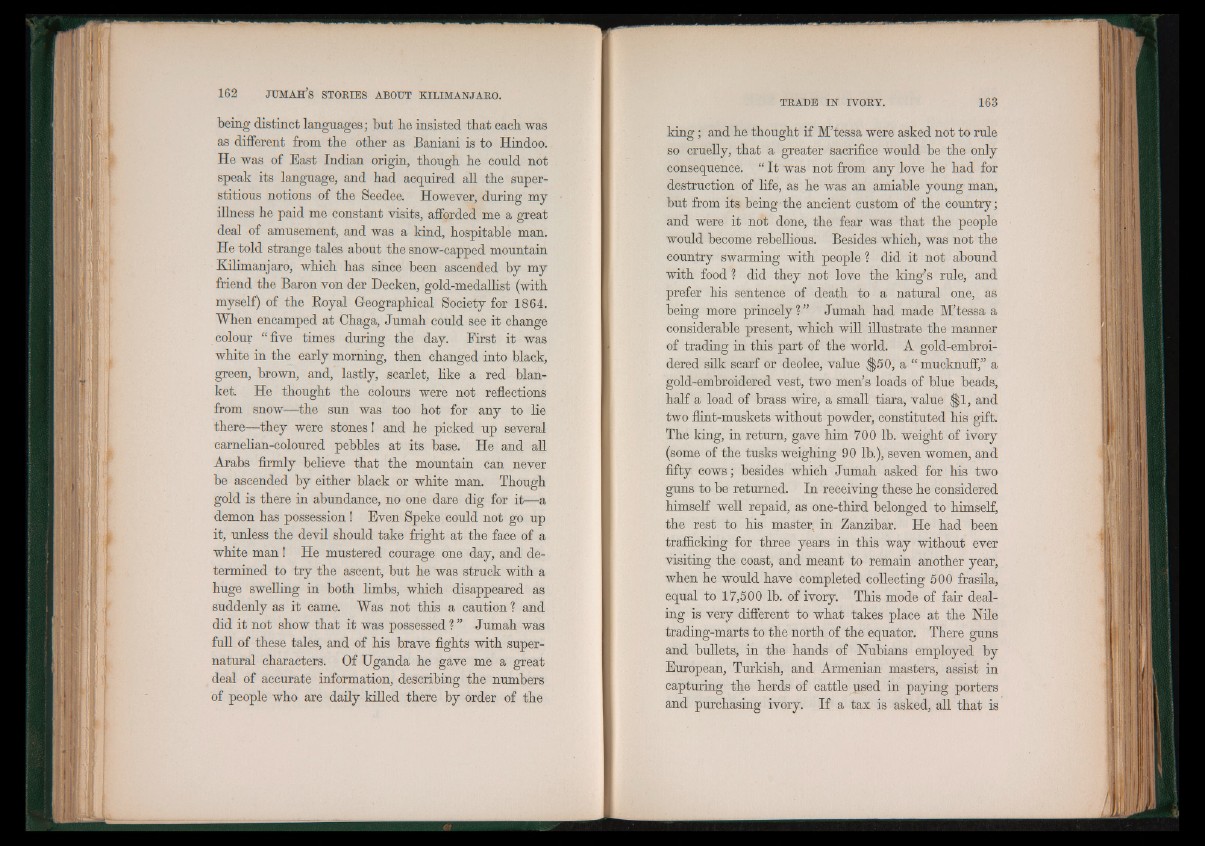
162 JUMAH’s STORIES ABOUT KILIMANJARO.
being distinct languages; but be insisted tbat each was
as different from the other as Baniani is to Hindoo.
He was of East Indian origin, though he could not
speak its language, and had acquired all the superstitious
notions of the Seedee. However, during my
illness he paid me constant visits, afforded me a great
deal of amusement, and was a kind, hospitable man.
He told strange tales about the snow-capped mountain
Kilimanjaro, which has since been ascended by my
friend the Baron von der Decken, gold-medallist (with
myself) of the Royal Geographical Society for 1 8 6 4 .
When encamped at Chaga, Jumah could see it change
colour “ five times during the day. First it was
white in the early morning, then changed into black,
green, brown, and, lastly, scarlet, like a red blanket.
He thought the colours were not reflections
from snow—the sun was too hot for any to lie
there—they were stones! and he picked up several
camelian-coloured pebbles at its base. He and all
Arabs firmly believe that the mountain can never
be ascended by either black or white man. Though
gold is there in abundance, no one dare dig for it—a
demon has possession ! Even Speke could not go up
it, unless the devil should take fright at the face of a
white man! He mustered courage one day, and determined
to try the ascent, but he was struck with a
huge swelling in both limbs, which disappeared as
suddenly as it came. Was not this a caution ? and
did it not show that it was possessed ? ” Jumah was
full of these tales, and of his brave fights with supernatural
characters. Of Uganda he gave me a great
deal of accurate information, describing the numbers
of people who are daily killed there by order of the
king; and he thought if M’tessa were asked not to rule
so cruelly, that a greater sacrifice would be the only
consequence. “ It was not from any love he had for
destruction of life, as he was an amiable young man,
but from its being the ancient custom of the country;
and were it not done, the fear was that the people
would become rebellious. Besides which, was not the
country swarming with people ? did it not abound
with food ? did they not love the king’s rule, and
prefer his sentence of death to a natural one, as
being more princely ? ” Jumah had made M’tessa a
considerable present, which will illustrate the manner
of trading in this part of the world. A gold-embroidered
silk scarf or deolee, value $50, a “ mucknuff,” a
gold-embroidered vest, two men’s loads of blue beads,
half a load of brass wire, a small tiara, value $1, and
two flint-muskets without powder, constituted his gift.
The king, in return, gave him 700 lb. weight of ivory
(some of the tusks weighing 90 lb.), seven women, and
fifty cows; besides which Jumah asked for his two
guns to be returned. In receiving these he considered
himself well repaid, as one-third belonged to himself,
the rest to his master, in Zanzibar. He had been
trafficking for three years in this way without ever
visiting the coast, and meant to remain another year,
when he would have completed collecting 500 frasila,
equal to 17,500 lb. of ivory. This mode of fair dealing
is very different to what takes place at the Nile
trading-marts to the north of the equator. There guns
and bullets, in the hands of Nubians employed by
European, Turkish, and Armenian masters, assist in
capturing the herds of cattle used in paying porters
and purchasing ivory. If a tax is asked, all that is